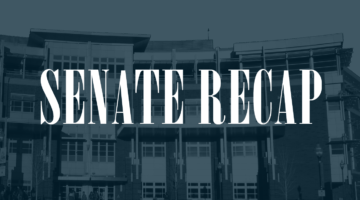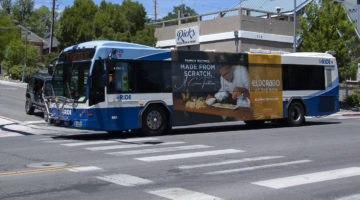
Photo: (CC) TEDxUniversityofNevada/ Flickr.com
Tim Snider, world and folk rock musician, performs at the 2015 TEDxUniversityofNevada on Friday, Jan. 23 in the Joe Crowley Student Union Theatre. Snider began to playing the violin at the age of 3.
By Rocío Hernández
Twenty speakers from the university, the city of Reno and around the world shared their “big ideas” last Friday, Jan. 23 at the third annual TEDxUniversityofNevada.
Speakers’ discussion topics ranged from the American Dream to changing language to intimacy with a partner.
“The event was designed to have an impact on the community, not just UNR,” said Bret Simmons, TEDxUniversityofNevada organizer. “When videos of our local community speakers [such as] Owen Roberts, Shila Morris, Hugh Hempel [and] Heidi Parker post to the TEDx YouTube channel, it shows the world that big ideas are alive and well in Reno.”
Speakers Tim Snider and Jennifer Knapp chose to deliver their messages through music. Knapp played three songs and spoke about her experience as a Christian and a member of the LGBT community. Snider played two songs, one that was inspired by his memories of a fire in Reno and the other was about appreciating a sunset on Mount Shasta in California.
Snider said that he chose to perform more than he spoke because music allows him to communicate with others better than he could than words.
“To me, music is a vehicle for creative expression and I hope that inspires people to creatively express themselves in whatever way is most honest and true to them,” Snider said.
Lucy Flores, former Nevada assemblywoman and one of the event’s speakers, said that the talks illustrated the power of narrative storytelling and its ability to teach audiences life lessons.
“Despite your own unique challenges and experiences in life, you are still able to still able to connect with that other person,” Flores said. “Their story still resonates with you in some way because we all share collective challenges, we all share collective ideals and things that we have in common.”
Reg Chhen Stewart, University of Nevada, Reno’s chief diversity officer, said that he sees TEDxUniversityofNevada as an event that can positively impact the university because of its educational value.
In a classroom setting, Stewart said that students are often taught using a variation of the Socratic method. Teachers are expected to ask the students questions and the students are expected to answer the questions. Lectures lead to an exam.
“In the end, this is an engaging way of communicating different concepts,” Stewart said. “It’s a great, new way to learn.”
According to Simmons, previous TEDxUniversityofNevada events have been successful, but 2015 was the best yet. However, in the future, Simmons said that he would like to see the event move out of the Joe Crowley Student Union, which holds 220 people, to a larger venue to provide more people with the opportunity to attend.

Photo: (CC) TEDxUniversityofNevada/ Flickr.com
Members of the audience listen to TEDxUniversityofNevada speakers on Friday, Jan. 23. The event started at 8 a.m. and ended at 4 p.m.
Speaker Highlights
Hugh Hempel
Hempel’s “idea worth sharing” advocated for the acceptance of medical marijuana. Hempel has seen the positive impact of marijuana-based medicine in his twin 11-year-old daughters. Addison and Cassidy Hempel suffer from Niemann Pick Type C or “Childhood Alzheimer’s”.
The disease can cause them to have up to 100 seizures a week, but Hempel found that Cannabidol, a cannabis-based medication, could reduce the amount of seizures the twins have daily more effectively than other prescriptions they have been given in the past. According to Hempel, cannabis has the potential to become “the big healthcare success story of our lifetime”.
Nicole Hockley
Hockley’s talk dealt with gun violence, an issue that personally affected the lives of her and her family. Her son was one of the 20 students whose life was taken in the shooting that took place at Sandy Hook Elementary School two years ago.
Hockley proposed that people can make a difference in their community at a grassroots level by getting involved with prevention programs, such as Say Something, which encourages youth to talk to a trusted adult whenever they feel unsafe, or host community discussions to decide what actions they could take to keep children safe.
Erica Greve
Greve’s dialogue stressed the power of social media. She is the founder and CEO of Unlikely Heroes, a program dedicating to aiding children affected by sex slavery. During her speech, Greve referenced the Chibok schoolgirl kidnapping in Nigeria where more than 276 girls were abducted last year. After the kidnapping, she witnessed people putting pressure on the Nigerian government through social media, but the impact of their Facebook posts and tweets faded when it was longer a trending Internet topic. Greve challenged the audience to use social media and be a voice for the voiceless.
Rocío Hernández can be reached at rhernandez@sagebrush.unr.edu and on Twitter @rociohdz19.











